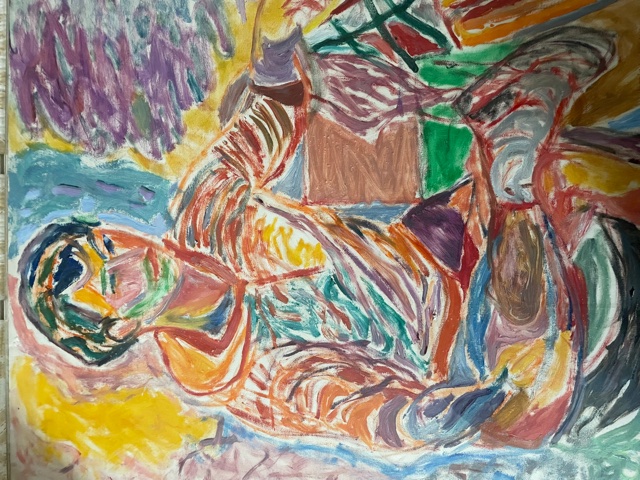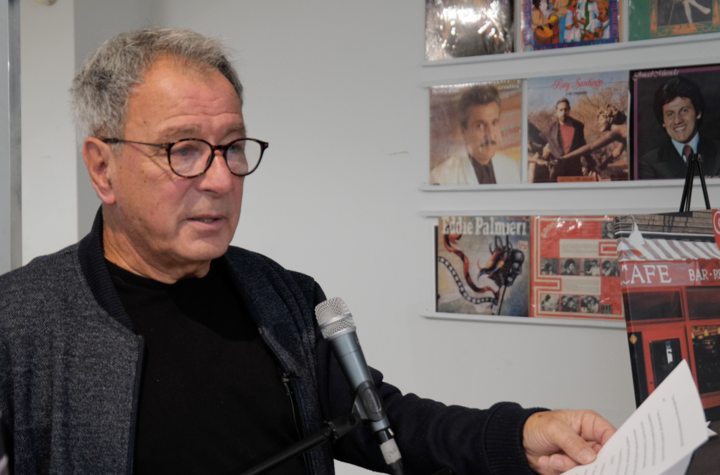BY HANNAH REIMANN | The Cornelia Street Café, an artistic home to thousands of performers, artists, writers and many others for more than 41 years, a restaurant with great food, and a wine bar that was well before its time with more than 35 wines by the glass, was a mecca of artistic and culinary activity, creativity and good times. Suzanne Vega, Eve Ensler, Arturo O’Farrill, David Amram and Oliver Sacks are only a few of the many luminaries who cultivated their craft and benefited from the space and the spirit of Cornelia. I recently had the pleasure of reminiscing with my friend Robin Hirsch about many things, past and present.
HR: Tell our younger readers, and others than might not know, in a nutshell about Cornelia Street Café and your experience there.
RH: Three of us who were all starving artists opened a little one-room cafe with a toaster oven shortly after The Mayflower (actually, 1977). Because we were artists and all kinds of other artists watched us clean out the Augean stables for more than two months, when we opened we realized that we might actually have a space where all kinds of artists could perform. Literally, from day one there were clown shows on the street outside, there were puppeteers inside, there were classical musicians, there were songwriters, there was every kind of performer doing stuff in a tiny, one-room cafe where every customer had to shut the f— up. And out of that grew something which meant a lot to quite a lot of people, including me. It enabled me to come out of the closet as a writer and performer in New York.
We grew from one room to two rooms and to three rooms and then, eventually, quite famously, Senator Eugene McCarthy, who happened to be a poet, came to read his poetry there together with another poet, Siv Cedering.
We realized, even if we kept it to ourselves, that word would get out, so we went “Clean for Gene” and cleared out our basement. That poetry reading was the first thing we ever did down there.
HR: What came first, the food, the wine or the performances?
RH: The performances. I think it was two years before we had a wine license. And five years before we had a proper kitchen.
HR: What are your feelings and thoughts since the closing of Cornelia Street Café four years ago at this time?
RH: I’m overcome with waves of grief, nostalgia and gratitude.
HR: What have you been doing since it closed?
RH: Dreaming up things which can essentially continue the spirit of the cafe, even after the pandemic hit, which was 15 months later. The legendary David Amram, as we were in the throes of closing, said, “I’m going to call you ‘Cornelia Street in Exile’ and I will follow you wherever you go.”

That’s what we have been since then. We did a whole slew of shows in Brooklyn. We did an outdoor music festival in the Meatpacking District. We did one of my little solo performances at the Integral Yoga Institute. We did a Purim Fest at The Bitter End, aptly named because it was the last show that we did before the pandemic closed everybody down three days later.
HR: If you could wave a magic wand, what would you create now?
RH: In a dream, it would be lovely to have another physical space where I was not responsible for the rent, for battling vile landlords, and where the sheer energy of New York’s extraordinary range of performers could flourish in a space that nurtured them.
One of the things I said on the last night from the stage was, first of all, to congratulate the audience and the performers for having collectively created with us a physical space where people got together in the flesh, something that no virtual space could possibly match.
HR: Tell us about your books. Where can they be found?
RH: My first book was a Holocaust-related memoir called “Last Dance at the Hotel Kempinski.” Every single word of that was written to be read at the cafe. It’s possibly the only Holocaust memoir to have been called “very funny” by The New York Times. My parents escaped from Hitler, from Berlin. Those of my family who survived (and quite a lot of them did not) were scattered across the globe. So, in some ways for me, actually planting a physical foot on the island of Manhattan 32 years after the war had ended, was an incredibly important psychological step.
Book number two was a riotous thing that I did with my kids when they were 7 and 10 at the time. We wrote a book of poetry called “F E G: Stupid Poems for Intelligent Children,” which has very learned footnotes. It’s all about language and great fun. I just weirdly did a reading for pre-K kids in Manhattan of “F E G” a week ago. It was great fun to do.
Publishing being what it is, these books can occasionally be found on Amazon.
The upcoming third book is a collection of pieces with the working title, “The Whole World Passes Through: Stories from the Cornelia Street Cafè.” It’s been in the works for a very long time. Portions of it have been published in various journals and papers.
It’s essentially what happens to a wandering Jew, namely me, when he finally stands still and opens the doors. The whole world passed through those doors. The collection won an international literary award from the Café Royal Cultural Foundation. That has not brought me any nearer a publisher, however, so…one foot at a time.
HR: If anyone reading this knows of a publisher who might be interested in this volume, please reach out to us here at The Village Sun (news@thevillagesun.com).
HR: What can you tell me about a film that is being made about you?
RH: At least five years ago a filmmaker named Michael Jacobsohn, who has a similar background to mine, approached me about making a film. He is also Jewish and his family fled Hamburg for Palestine, eventually landing in the U.S. — also in New York. Michael wanted to address his own background by at least alluding to it through my story. He’s been interviewing me for years. While he was filming me, the cafe went through this excruciating business of closing, which, I have to say, in a weird way, had terrible ontological echoes of what happened to my parents, who lost everything. I mean, this is not a holocaust, etc., etc., but I think that Michael has realized that there are a lot of echoes. He has been filming and interviewing a lot of people about their relationship to the cafe and, perhaps, what it meant to them.
HR: What else would you like to share with our readers?
RH: I think what we built over a very long period — more than 41 years — grew organically. We had no idea that this would last for that long, that it would become a restaurant, bar, a performance space and so forth. I think there’s an enormous virtue in not knowing. So I can’t say I’ve advised my younger son, who has retired at the age of 30 from Google, what to do next. Maybe he can publish my book. I’ve never had a plan in my life. I put one foot in front of the other, trip, and then I go there. That has served me in very good stead, partly because I don’t like planning but partly — and more importantly — because it has allowed me to simply reap what was being sown completely unbeknownst to me.


Dear Hannah,
Thank you for writing such fine and incisive article for The Village Sun about Robin Hirsch and the oasis he created for decades with the Cornelia St. Cafe.
People from many countries overseas as well as from the five boroughs of New York, Iceland, Canada, South America and from all over the USA came to New York to see all the cultures that were still here and the new voices who were making changes everyday in all the arts.
Naturally people would go to Greenwich Village and if they were leucky enough, go to the Cornelia St Cafe.
Rather than finding themselves in an overpriced, unfriendly place that was similar to visiting a friend in a maximum-security prison, everyone who met Robin felt the warmth and graciousness that filled every inch of the Cafe.
Whether you drank the finest wine or had the best meal ever at prices you could afford, the combination of elegance and down home old Greenwich Village joi de vivre and the New Orleans “let the good times roll” celebratory spirit filled the air.
Whether performing there or hanging out and seeing the endless talent that flourished at the Cafe every night, we were all reminded that artistic expression of all genres, when presented in a loving and gracious way, was not only fun for all ages.
We realized that this was the best way to celebrate a sense of COMMUNITY and the joy of being in one of the truly magical neighborhoods of New York City
Robin set an example and provided a GPS for every community in the USA on how to present the arts.
We can hardly wait to see what this innovative man will do next.
And when we do, we’ll all be there to cheer him on.
David Amram
The closing of the Cornelia Street Cafe was a great loss to the community.